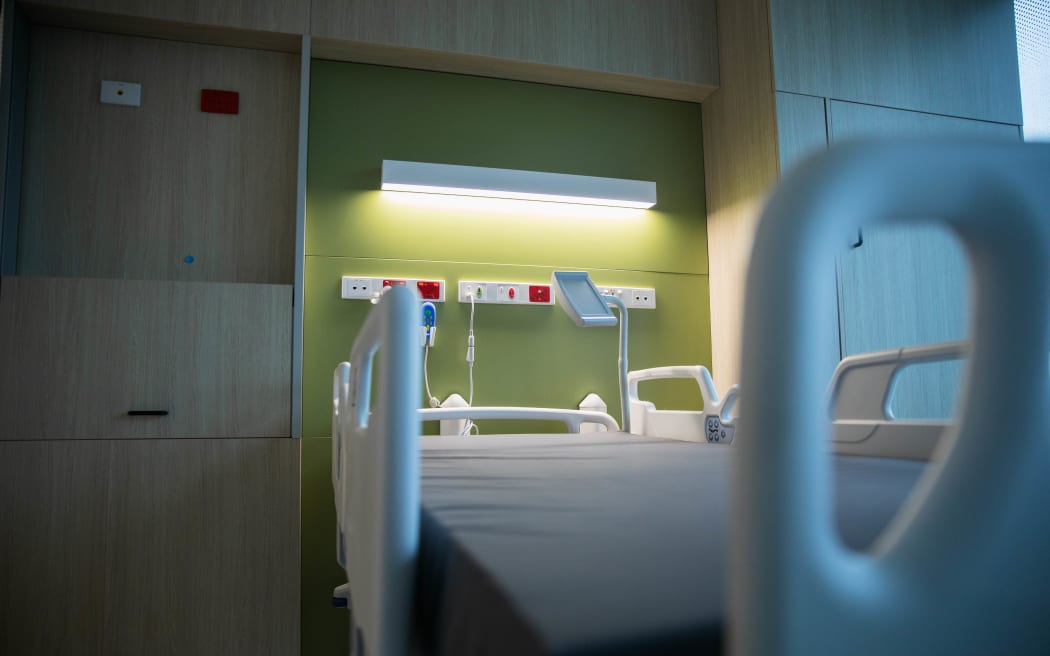
Timely access to non-acute healthcare, as well as some urgent time-critical care, is becoming increasingly dependent on an individual's ability to pay for it, the ASMS report said. Photo: RNZ / Samuel Rillstone
A Bay of Plenty iwi organisation has bought private health insurance for its 110 workers for the first time because they are getting hit so hard by hospital waiting lists.
It knew of two similar groups that have had to do the same recently, even though it was "absolutely ridiculous", said the boss of Whakatāne's Ngāti Awa Social and Health Services.
New Zealanders' dependency on private healthcare was "rapidly increasing... to provide what public services can't", according to a new report from the senior doctors' union, the Association of Salaried Medical Specialists (ASMS), released on Tuesday.
The union, in an industrial dispute with Te Whatu Ora over doctors' pay and conditions, said public hospital discharges had been falling a bit, and private hospital use rising a lot - alongside health insurance uptake - in the past decade.
"Every specialist moving to the private sector can exacerbate the shortage in the public sector," its new report said.
Ngāti Awa chief executive Enid Ratahi-Pryor had begun noticing that more and more sick leave was being taken by her mostly female Māori staff. It turned out they were having more and more surgery, though intervention earlier on could have avoided it.
"This is all about staff putting food on the table before their own health need," she said.
Lacking the time, money and insurance to get medical problems checked on early, they joined the lengthening public queue, and their conditions were getting worse.
"Even getting specialist or second opinions is not something that our staff were doing," Ratahi-Pryor said.
So she bit the bullet and shelled out more than $100,000 on private health cover for the staff.
"Our rationale for actually purchasing private health insurance was to enable them to actually be diagnosed early.
"As an iwi organisation, we're there to support people, so for our organisation to be purchasing private insurance is absolutely ridiculous. We support the public system. But again, I've got to look after the welfare of our staff."'
The other essential lever it gave her was in recruiting workers in a crushed sector.
"I'm not happy about that. It's just the position that we've been put into. We've now gone into that private insurance market and we've purchased, so we're contributing to the shift from public to private."
There was a 4 percent fall in public hospital discharges from 2014 to 2020, and a 38 percent rise in private hospital use in that time, according to the ASMS report, based on what it said was previously unpublished data from health surveys, Te Whatu Ora and ACC.
Te Whatu Ora said staff made 318,769 planned care interventions, such as surgeries, in the year to June - compared to 299,694 the year before, up 6.4 percent.
"Te Whatu Ora continually monitors services and looks at how our delivery of healthcare and support can be improved across Aotearoa," national director of delivery for hospital and specialist services Jo Gibbs said.
It used private sector capacity where appropriate to "further reduce waiting times".
In working on the 101 recommendations made 11 months ago by the Planned Care Taskforce, it was making "good progress", particularly on the goal to have all patients (except orthopaedic patients) who have been waiting longer than 365 days treated by the end of this December.
Healthcare choices were getting tougher as public hospital headwinds got stiffer.
"Timely access to non-acute healthcare, as well as some urgent time-critical care, is becoming increasingly dependent on an individual's ability to pay for it," the ASMS report said.
Bill Raynor, so far, has had the ability to choose. The president of Grey Power on the North Shore chose to get his cataracts done using his basic health insurance recently - though that might be it.
"That's about $4800 a year [in premiums]... I'm actually on that point of giving up on it because it's just too much."
A family member had to wait over a year to get cataracts done publicly. But Raynor said he was not worried, both because in a real emergency - such as when he needed gallbladder surgery this year - the public response "was instant".
"It's the 'getting in' that's the issue," he said, because "you get to 83, you know you're running out of time anyway".
For others in Grey Power though, health access was a serious issue, he added.
Indicators appear all to point in one direction: 140,000 more people signed up for health insurance last year; 80,000 got non-acute surgery at the largest private network Southern Cross; the Private Surgical Hospitals Association stated it performed two-thirds of all elective surgery in 2022; and 40 percent of a sample of 1600 specialists told ASMS they planned to reduce their hours in the public system.
Many of those are expected to pick up more hours in the private sector instead.
On top of that, a decent chunk of the private surgery is paid for by the taxpayer - "outsourcing" it is called - as is almost 90 percent of ACC work.
None of this is new, and all of it has been building up for years. In 2018, the Private Surgical Hospitals Association said hospital staff were said to be "stressed, exhausted and overworked by the constant pressures in the public system", and "private hospitals can reduce burden on struggling DHBs".
The ASMS report said the top reason doctors were leaving the public sector was remuneration (57 percent), followed by managing time and workload (54), clinical satisfaction (50), management culture (39) and bureaucracy/administration (37).
Reasons for staying/returning included remuneration (51 percent), staffing levels (44), resourcing (37), flexibility in work arrangements (34) and improved management culture (31).
Ratahi-Pryor said free access to quality services was meant to be the public sector's mainstay, but that was not happening.
"Private health insurance for us actually meets two or three of our immediate needs - healthy staff, retaining existing staff and also helping to recruit others."







